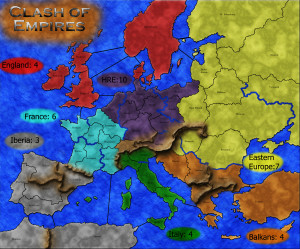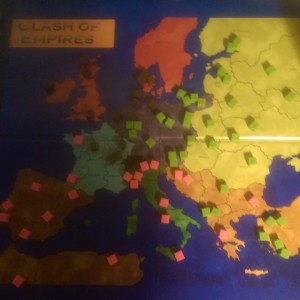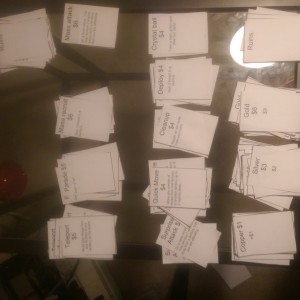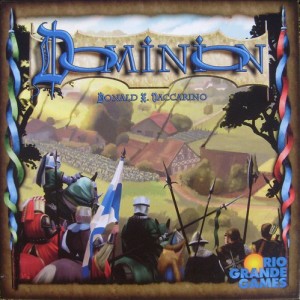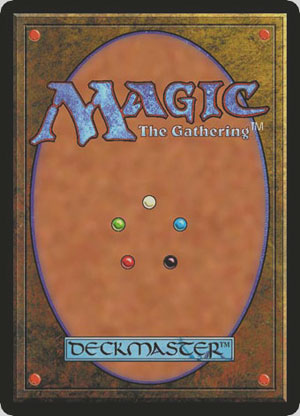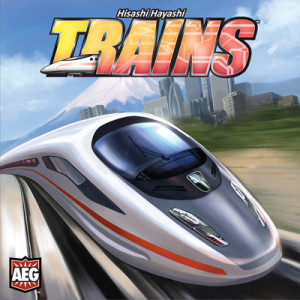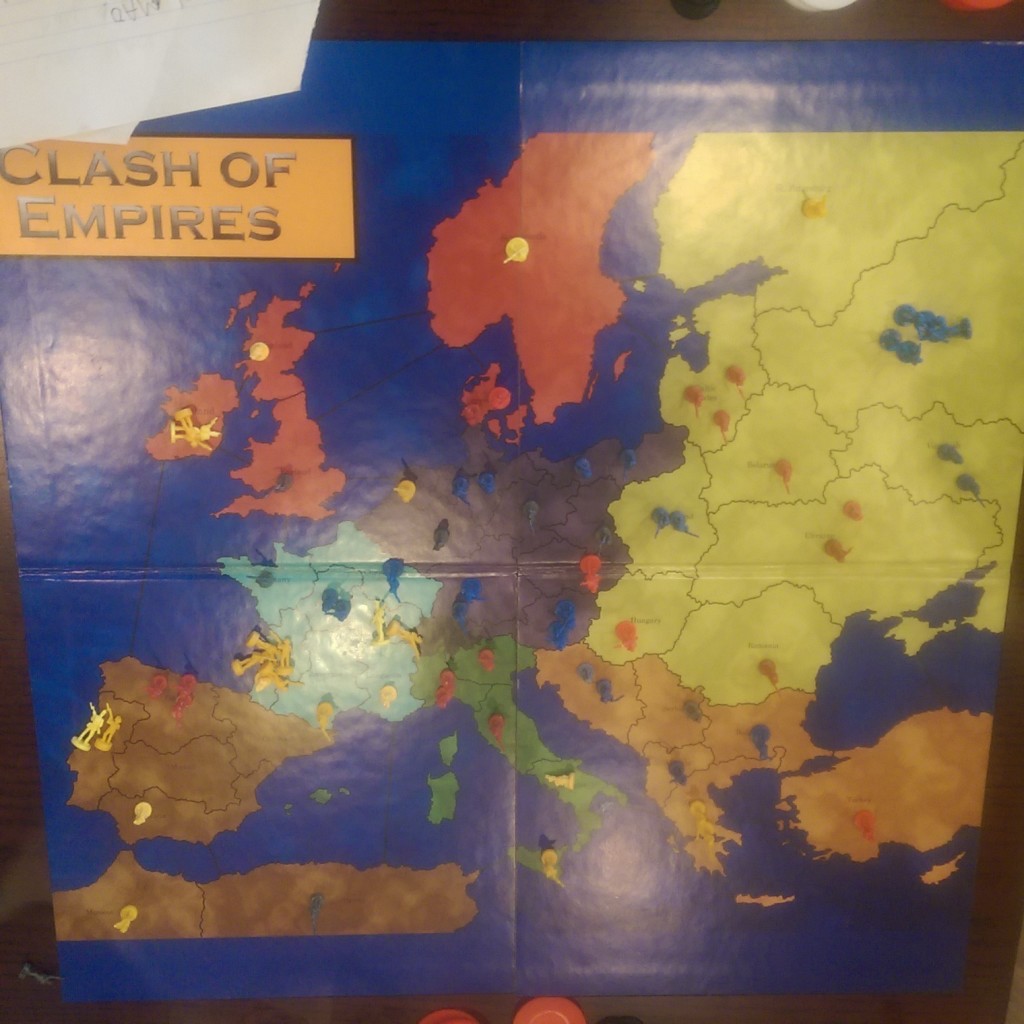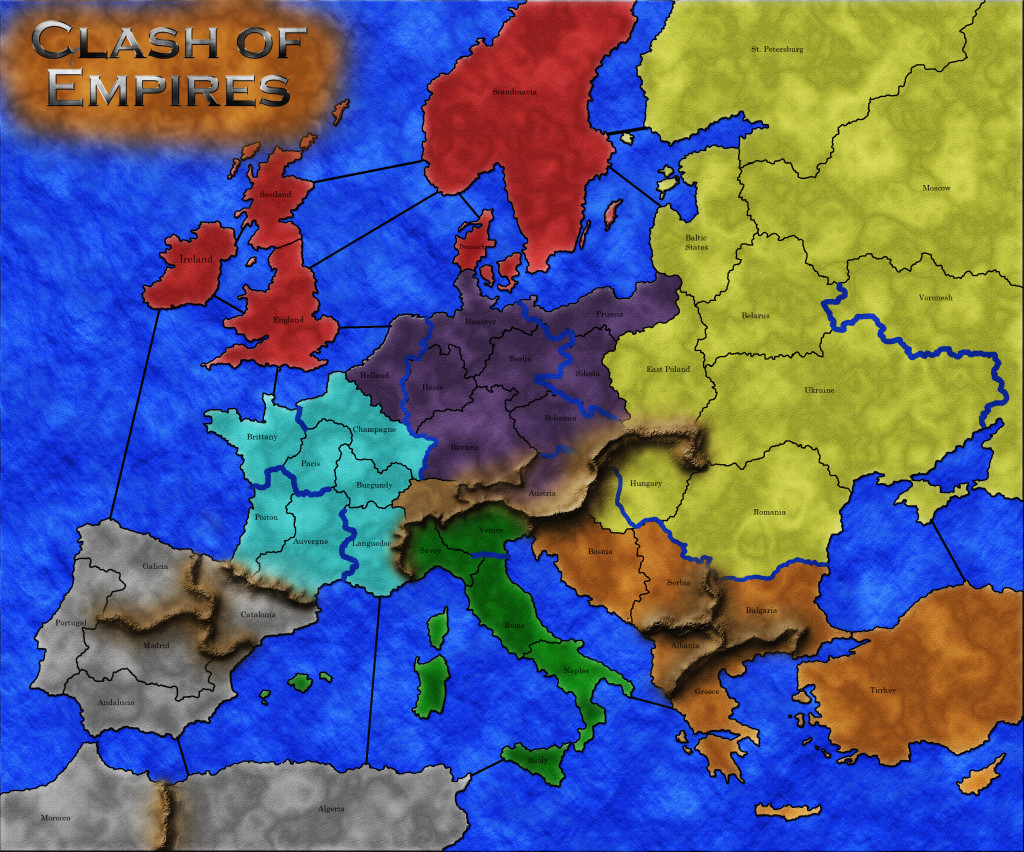Monthly Archives: April 2015
Deckbuilder Module Playtest
Today, I ran an informal playtest to test a deckbuilding variant. There were 3 players who each followed different strategies.
- Player 1 (Brown) focused on attacking early and did not buy many cards
- Player 2(Pink) built up a deck of offensive cards and then attacked mid game
- Player 3(Green) focused on improving their deck for most of the game and attacked during the end game.
Observations
- Ruin cards did a poor job of slowing down Brown because they didn’t buy many cards. On the other hand, ruins significantly hurt Pink and Green because it clogged up their decks.
- Buying too many money cards is not a good idea. Green ran into trouble during the late game because they could not use money cards to attack.
- Battles with large numbers of troops did not happen until the game was almost over.
- By the end of the game, Brown was in a weak position because of the inability to play cards and would have lost if the game had lasted for more rounds. On the other hand, Green and Pink were in strong positions because they had better cards.
- Cards that gave bonuses to combat were more valuable.
Scoring
Round 5
- Brown: 21
- Pink 14
- Green: 13
Round 10
- Brown: 42
- Pink: 29
- Green 26
Round 15
- Brown 53
- Pink 29
- Green 35
Round 20
- Brown: 62
- Pink: 40
- Green: 46
Round 25
- Brown: 69
- Pink: 52
- Green :61
Round 30
- Brown: 78
- Pink: 65
- Green: 75
Changes
- Find a way to make money useful during the end game.
- Make the cards that do not involve combat boosts cheaper.
Deckbuilding variant
In order to add more decision making to Clash of Empires, I am considering a card-driven variant. Throughout the game, players will create a deck of cards and play them to influence their pieces on the board.
The mechanics have been influenced by the following games.
Rules changes for deckbuilding variant.
Setup
- Each player draws 5 copper and 5 ruin cards.
Game turn
- Do one of the following.
- Play an action card.
- Take a basic action defined by the basic Clash of Empires rules.
- Play money cards and buy a card. Purchased
cards go into your discard pile. - Remove a ruins card from your hand.
- Discard cards and draw 5 more.
Scoring
- No scoring from region bonuses.
Card list
- Ruins: Gained every time you take a territory.
- Cleanup $4: Return all ruin cards from hand.
- Copper $0: Gain $1
- Silver $3 : Gain $2
- Gold $6: Gain $3.
- Quick move $2: Move any number of troops from one territory to another territory up to 2 regions away.
- Teleport: Move any number of troops from one territory to any other territory you own, or an enemy territory adjacent to one of yours.
- Surprise attack $3: Same as basic move except that you may remove 1 enemy troop from a territory that you are attacking.
- Mass attack :$6 Same as basic move, but remove 2 enemy troops before resolving combat.
- Teleport $5: Move you troops from one territory to any territory on the board.
- Deploy $4: Gain +2 troops directly onto your board.
- Mass recruit $6: Gain +3 troops in any territory.
- Parade $5: Gain +1 VP.
- Crystal ball $4: Take a basic action and draw two cards.
Playtest Report from 4-19-2015
Today, I ran a playtest of Clash of Empires. Here are notes from the playtest.
Results
- Red: 94 points.
- Blue: 87 points.
- Yellow: 97 points.
Observations.
- Players figured out how to play quickly.
- Turns were fast.
Playtester comments
- Players were all hardcore board games.
- Attacking to gain majorities is good.
- Rules were simple to learn.
- Not having dice is good.
- Random setup makes the game too dependent on luck.
- Scoring is tedious.
- Out of the 3 players who played, two players said they would not want to play again. One of them said that if he had time, he would prefer Risk.
- It is necessary to have an incentive to attack before all reinforcements are played.
- It was too easy to knock over troops.
- There is no incentive to attack until you lost your troops.
- Scoring is tedious.
- Random scoring intervals are annoying.
Suggestions for improvements
- There needs to be more tension between deploying and attack.
- Spend points to buy reinforcements.
- Have dice represent troop counts.
- Add cards to represent actions.
- Make sure each player is guaranteed reinforcements.
Based on the suggestions, I will be focusing on changes that fix the following issues.
- Lack of incentive to attack.
- Add base reinforcement value to each player regardless of territories controlled.
- Add more decision making.
Updated Map
Respawning Troops
I am considering modifications to the combat mechanics that allow players to respawn troops lost in combat.
Details
- Players start off with 15 troops plus 1 troop per territory they own.
- Each player has a reserve area where they store troops lost in combat. The reserve starts off with 0 troops.
- Combat
- Troops lost in battle are placed in a player’s reserve.
- If the attacker wins, the attacker places one troop from their bag on the conquered territory, and the defender removes one troop from their reserve.
- A player may spend an action to place any number of troops from their reserve onto one territory.
Potential Change to Scoring Rules
Summary
I am considering changes to the scoring system to periodically give points for controlling or dominating certain map regions in place of modifying the combat system. This will encourage attacking to secure points for a region and prevent opponents from getting points in a region.
Details
- Players will get points for having the most territories in a region.The players in 2nd and 3rd place will also get some points.
For the Europe map, regions will be scored like the following.
| Region | 1st | 2nd | 3rd | 4th |
|---|---|---|---|---|
| Iberia | 5 | 3 | 1 | 0 |
| France | 6 | 3 | 2 | 0 |
| England | 3 | 2 | 1 | 0 |
| Italy | 4 | 3 | 1 | 0 |
| Central Europe | 8 | 4 | 2 | 0 |
| Balkans | 5 | 3 | 2 | 0 |
| Eastern Europe | 7 | 4 | 2 | 0 |
If there is a tie, each player gets half of the possible points, rounded down.
Playtest report
Observations
- Occupying an entire region was valuable to stop other players from getting points. However, it was better to expand in regions controlled by an opponent to get points from them.
- Controlling the center of the map is difficult because a player can be attacked from multiple sides
- Brown did well because they were not attacked. Green and Orange were too busy with other parts of the map.
- Orange became a lame duck by the middle of the second round because they were fighting too much and did not have enough troops. Part of the problem is that they were trying to hold onto Central Europe, which is in the center of the map.
- It is significantly easier to control a region near the edge of the map.
- Players spent a lot of effort fighting over 2nd place in a region.
Potential changes
- Decrease value of outer regions
- New reinforcement system
- Players will be able to redeploy troops lost in battle
- Players will not gain bonus troops at the end of each round.
- Players will gain a troop when taking over a territory, and lose a troop when they lose a defensive battle.
